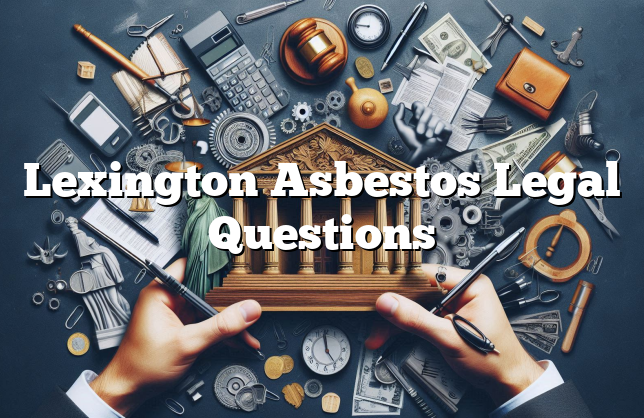Lexington, a city steeped in history, also carries a legacy of asbestos use that continues to impact the health and legal rights of its residents. Asbestos, once prized for its resilience and insulating properties, is now recognized as a dangerous carcinogen responsible for numerous health complications. This article aims to shed light on the legal intricacies surrounding asbestos exposure in Lexington.
Understanding the Scope of Asbestos Exposure in Lexington
Lexington’s industrial past, particularly in manufacturing and construction, has left behind a trail of asbestos contamination. Many older buildings, factories, and even homes may still contain asbestos-containing materials, posing a risk to occupants. Inhaling or ingesting asbestos fibers can lead to severe illnesses such as mesothelioma, lung cancer, and asbestosis.
Most Asked Lexington Asbestos Legal Questions
1. What are the common sources of asbestos exposure in Lexington?
Asbestos exposure in Lexington can stem from various sources, including older buildings with deteriorating insulation, pipe coverings, flooring, and ceiling tiles. Industrial sites, shipyards, and power plants also pose a risk due to their historical use of asbestos.
2. Who can be held liable for asbestos-related illnesses in Lexington?
Liability for asbestos exposure is a complex issue. It may involve multiple parties, such as manufacturers of asbestos-containing products, employers who failed to protect workers, property owners who neglected to address asbestos hazards, and suppliers who distributed asbestos materials.
3. What legal options are available to victims of asbestos exposure in Lexington?
Lexington residents diagnosed with asbestos-related diseases have several legal avenues to explore. They can file personal injury lawsuits against responsible parties, seek compensation from asbestos trust funds established by bankrupt companies, or pursue workers’ compensation claims if their exposure occurred in the workplace.
4. How long do I have to file an asbestos lawsuit in Lexington?
The statute of limitations for filing an asbestos lawsuit in Lexington varies depending on the specific circumstances and the type of claim. It is crucial to consult with a legal professional as soon as possible after diagnosis to determine the applicable deadlines.
5. Can family members of asbestos victims seek legal recourse?
Yes, family members of individuals exposed to asbestos may have legal grounds to file a claim. For instance, if a family member developed mesothelioma due to secondary exposure from asbestos fibers brought home on a loved one’s clothing, they might be entitled to compensation.
6. How do I find a reputable asbestos lawyer in Lexington?
Selecting a qualified asbestos attorney is crucial for navigating the complexities of asbestos litigation. Look for attorneys who specialize in asbestos-related cases, have a proven track record of success, and are committed to advocating for their clients’ rights.
7. What types of compensation can I expect in a Lexington asbestos lawsuit?
The compensation awarded in an asbestos lawsuit in Lexington varies depending on various factors, including the severity of the illness, medical expenses incurred, lost wages, pain and suffering, and the degree of the defendant’s negligence.
8. Are there support groups or resources available for asbestos victims in Lexington?
Yes, Lexington offers several support groups and resources dedicated to assisting individuals and families affected by asbestos-related diseases. These organizations provide valuable information, emotional support, and guidance throughout the legal process.
9. What are the challenges involved in proving an asbestos claim in Lexington?
Proving an asbestos claim in Lexington can be challenging. It requires establishing a direct link between asbestos exposure and the diagnosed disease, identifying all responsible parties, and gathering sufficient evidence to support the claim.
10. What if the company responsible for my asbestos exposure is out of business?
Even if the company that exposed you to asbestos is no longer operating, you may still have legal options. Many companies have established trust funds to compensate victims of asbestos exposure. An experienced attorney can help you explore these options.
11. What are the long-term health risks associated with asbestos exposure?
Asbestos exposure can have severe long-term health consequences. Asbestos fibers can lie dormant in the body for years or even decades before causing illnesses like mesothelioma, lung cancer, or asbestosis. Regular medical check-ups are crucial for individuals with a history of exposure.
12. How can I protect myself and my family from asbestos exposure in Lexington?
To minimize the risk of asbestos exposure, be aware of potential sources in your home or workplace. If you suspect the presence of asbestos, consult with qualified professionals for testing and safe removal.
13. Are there regulations regarding asbestos abatement in Lexington?
Yes, Lexington has specific regulations governing the removal and disposal of asbestos. These regulations are designed to protect public health and ensure the safe handling of asbestos-containing materials.
14. What should I do if I find asbestos in my home or workplace?
If you suspect the presence of asbestos in your home or workplace, do not attempt to remove it yourself. Asbestos removal should only be performed by trained and certified professionals to avoid further contamination and exposure.
15. Where can I find more information about asbestos legal issues in Lexington?
Several resources are available to provide information and assistance regarding asbestos-related legal matters in Lexington. Consult with experienced attorneys, support groups, and government agencies specializing in asbestos regulations and victim advocacy.
Conclusion
The legal implications of asbestos exposure in Lexington are complex, but understanding your rights and seeking qualified legal counsel can empower you to pursue justice and compensation. By taking proactive measures to protect yourself and your family, you can minimize the risks associated with asbestos exposure in this historic city.


